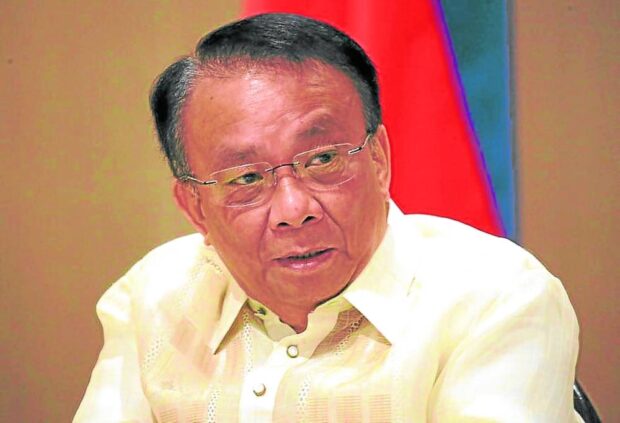
Lucas Bersamin —PPA POOL
MANILA, Philippines — President Ferdinand Marcos Jr. decided to slow down in launching the Maharlika Investment Fund (MIF) to ensure that there are enough safeguards in the implementing rules and regulations (IRR) of Republic Act No. 11954, the law creating the sovereign wealth fund, according to Executive Secretary Lucas Bersamin.
“He wanted to study carefully the IRR to ensure that the purpose of the fund will be realized for the country’s development with safeguards in place for transparency and accountability,” Bersamin said in a brief statement issued on Wednesday.
Enacted on July 18, RA 11954 mandated the national treasurer to come up with the IRR for the MIF law within 90 days. The Bureau of the Treasury (BTr) issued the IRR 41 days later, on Aug. 28.
In a memorandum dated Oct. 12 and addressed to the heads of the Treasury, Land Bank of the Philippines, and Development Bank of the Philippines (DBP), Bersamin said that “upon the directive of the President, the Treasurer of the Philippines, in coordination with [Landbank] and DBP, is hereby directed to suspend the implementation of the IRR” of the MIF law.
Bersamin did not respond to the Inquirer’s repeated requests for comment to explain further the president’s decision.
Presidential Communications Secretary Cheloy Velicaria-Garafil also did not respond to a request for comment.
It remained unclear whether Landbank, DBP, and the Bangko Sentral ng Pilipinas (BSP) would return the money they had contributed to the MIF following the suspension of the implementation of RA 11954.
The law mandated Landbank to contribute P50 billion, and DBP to chip in P25 billion. They remitted the respective amounts to the Treasury on Sept. 14.
The national government is also required to contribute P50 billion to the MIF, which will come mainly from BSP dividends.
The President’s directive to hold the IRR for further study came almost a month after the MIF was challenged at the Supreme Court.
Solicitor General Menardo Guevarra said on Wednesday that government lawyers were preparing to defend the constitutionality of RA 11954 despite the President’s suspension of its implementation.
According to Guevarra, who serves as the government’s top lawyer, his office has not officially received the copy of the Supreme Court (SC) resolution directing respondents Congress, Finance Secretary Benjamin Diokno, and Bersamin to comment on the petition.
“[B]ut we have been preparing our comment since the court’s resolution appeared in the SC website,” Guevarra told reporters in a text message.
Asked how the suspension order of the President would affect the case, Guevarra said: “If the implementation is indeed suspended, it’s up to the petitioners if they wish to withdraw the petition. But if they don’t, and the SC does not suspend the proceedings either, the (Office of the Solicitor General) will be prepared to submit its comment on the validity of the MIF law.”
The petition questioning the legality of the MIF law was filed at the high tribunal last month by Senate Minority Leader Aquilino Pimentel III, Bayan Muna chair Neri Colmenares, and former Bayan Muna lawmakers Carlos Isagani Zarate and Ferdinand Gaite.
In their petition, they claimed that it was a “dangerous” law as it “entrusts hundreds of billions in public funds to unknown fund managers and an amorphous nine-member Board of Directors.”
They likewise argued that Marcos’ certification of the MIF as urgent in Congress was void for failing to meet the constitutional requirements, citing Section 26 (2) Article VI of the Constitution which requires a bill to pass three readings on separate days unless an immediate enactment was needed due to calamity or emergency.
“The presidential power and prerogative to certify to the necessity of the immediate enactment of a bill under [the Constitution] is not absolute, but rather subject to the requirements,” they said, pointing out that “the existence of a public calamity or emergency, the necessity of the enactment, and that such immediacy would justify doing away with the necessary legislative requirement, were all not present.”
The petitioners added that the MIF failed to satisfy the test of economic viability, which, they said, was among the limitations imposed by the Constitution to prevent the depletion of public funds.
The MIF law also violated the independence of the BSP, the petitioners claimed.
No special treatment
Meanwhile, regulators will not give special treatment to Landbank and DBP on their request for a reprieve in complying with the capitalization requirements following their contributions to the MIF.
BSP Governor Eli Remolona Jr. on Wednesday said this in an interview with journalists, adding that he was also apprised of a directive from President Marcos on the suspension of the IRR governing the MIF.
“Someone sent me the memo by the Executive Secretary (Bersamin),” Remolona said. “[But] I don’t know the reason for it [because] I’m not part of that discussion.”
“As far as I know, it is a suspension of the implementing rules, not a cancellation of the fund [or the MIF itself],” he noted.
Remolona said he did not know how the suspension of the MIF law’s IRR would affect the pending request for regulatory relief lodged by Landbank and DBP after they remitted to the Treasury their contribution.
DBP president and chief executive Michael de Jesus earlier said that if their contribution to the MIF was not included in the computation of DBP’s capital, the state-run bank’s ability to comply with BSP regulations on capitalization might be undermined.
Still, both banks and BSP officials clarified that neither Landbank nor DBP was noncompliant at the moment, even after they had made their contributions to the MIF.
“As far as [banking] regulation is concerned, we will evaluate the request [for regulatory relief] as we do for any other request by banks, and then we will carry out the usual regulations that we carry out,” Remolona said.
“So, they will not be treated in a special way,” the BSP chief pointed out. “They will be regulated the way we always regulate banks.”